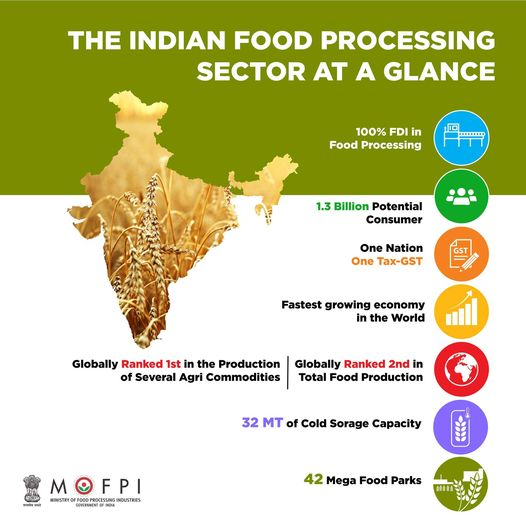-
07 Aug 2024
GS Paper 3
Economy
Day 27: Explain the scope and significance of the food processing industry in India. (150 words)
Approach
- Briefly define the food processing industry and its role in the agricultural sector.
- Highlight the significance of the food processing industry in India.
- Discuss the scope of the food processing Industry in India.
- Mention some challenges related to the food processing industry in India.
- Conclude Suitably.
Introduction
The food processing industry refers to the transformation of raw agricultural products into value-added food items through various techniques such as preservation, packaging, and preparation. This industry plays a vital role in the agricultural sector by enhancing the shelf life of perishable goods, reducing post-harvest losses, and increasing the overall value of agricultural produce.
Recently, the food processing sector in India has achieved an average annual growth rate (AAGR) of approximately 7.26%, highlighting its significant economic potential.
Body
The Significance of the Food Processing Industry in India :
- Economic Growth:
- The Gross Value added (GVA) in the food processing sector was Rs.2.24 lakh crore in 2019-20 contributing 1.69% of the total GVA in the country
- The sector has attracted USD 6.185 billion FDI equity inflow during April 2014-March 2023.
- Employment Generation:
- Food processing sector is one of the largest employment providers in the organised manufacturing sector with 12.22% employment in the total registered/organised sector.
- Value Addition:
- By transforming raw agricultural products into value-added goods, the industry enhances the income of farmers and producers, improving their livelihoods.
- The share of processed food exports in agri-exports has increased substantially from 13.7% in 2014-15 to 25.6% in 2022-23.
- Food Security:
- The sector plays a crucial role in reducing post-harvest losses, ensuring a stable supply of food, and contributing to national food security.
- According to the Indian Council of Agricultural Research (ICAR), approximately 6-18% of cereal production, 30-40% of fruits and vegetables, and 10-12% of pulses and oilseeds are lost annually post-harvest.
The Scope of the Food Processing Industry in India :
- Market Growth: The Indian food processing market is projected to reach approximately ₹12.5 lakh crore by 2025, driven by increasing urbanization, rising disposable incomes, and changing lifestyles that favor convenience foods.
- Competitive Advantage: India is the largest producer of milk and one of the leading producers of fruits, vegetables, poultry meat.India has access to several natural resources that provides a competitive advantage in the food processing sector.
- Rising Demand for Processed Foods: With a growing population and a shift towards healthier, ready-to-eat, and packaged foods, there is an increasing demand for processed food products. This trend is expected to continue, creating numerous opportunities for growth.
- Export Potential: The food processing sector can significantly contribute to India's export earnings. Processed food exports are expected to rise, with the global food market continuously expanding.
- Integration with E-Commerce: The rise of e-commerce platforms provides a unique opportunity for food processing companies to reach consumers directly, enhancing market access and expanding their customer base.
- Development of Agri-Entrepreneurship: The sector encourages agri-entrepreneurship by providing opportunities for small and medium enterprises (SMEs) and startups, which can innovate and address specific market needs, thus boosting overall sector growth
- Health and Wellness Trends: The increasing focus on health and wellness is driving demand for organic, functional, and fortified foods. The food processing sector can capitalize on this trend by developing innovative products that meet health-conscious consumers' needs.
Challenges Related to Food Processing Sector:
- Lack of Cold Chain and Storage: Inadequate cold storage and transportation facilities result in significant post-harvest losses of perishable goods. This not only affects food quality but also impacts the income of farmers.
- Fragmented Supply Chain: The supply chain in India is highly fragmented, leading to inefficiencies and increased costs. Poor road and rail infrastructure can result in delays and losses during transportation.
- Complex Regulations: The food processing industry is subject to a complex web of regulations, licenses, and permits, which can be challenging for businesses to navigate.
- Inconsistent enforcement of regulations can lead to unfair competition and quality issues.
- Food Safety Concerns: Ensuring food safety and quality standards across the supply chain remains a significant challenge. Contaminated or adulterated food products can harm public health and damage the reputation of the sector.
- Research and Development: Limited investment in research and development inhibits innovation and the development of new, value-added products.
- India’s research and development (R&D) expenditure-GDP ratio of 0.8% is very low when compared to major economies and is much below the world average of 1.8%.
Conclusion
The food processing sector in India is poised for significant growth, driven by market demand, government support, and technological advancements. By embracing innovation and sustainability, the industry can unlock its full potential, contributing to economic development, food security, and improved livelihoods for millions of people.





